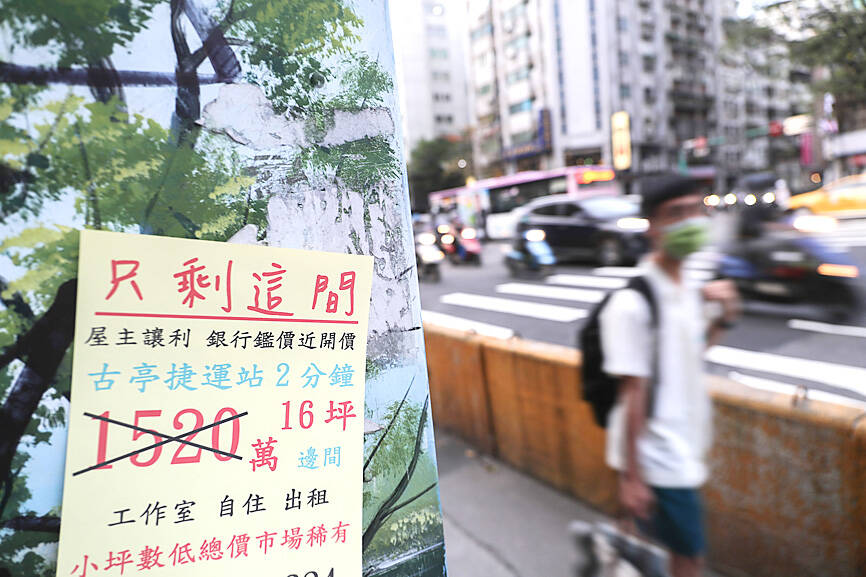The central bank’s latest interest rate hike is likely to rub salt in the wounds of the housing market, which has seen transactions shrink by 28.3 percent in the first two months of this year due partly to monetary tightening, analysts said on Thursday.
Interest rates on mortgages would climb higher than 2 percent, from 1.35 percent before March last year, meaning that households on 20-year mortgages of NT$10 million (US$329,457) would have to pay NT$51,182 per month, higher than monthly wages for many people in Taiwan, Evertrust Rehouse Co (永慶房屋) said.
The average monthly salary in January was NT$45,376, the Directorate-General of Budget, Accounting and Statistics said.

Photo: CNA
The rate would require an extra NT$840,000 in overall interest payments for people with 20-year mortgages and NT$1.3 million more in interest for those with 30-year mortgages, the broker said.
Households would have to tighten their belts to shoulder extra financial burdens in the absence of proportional wage increases, Evertrust said, adding that prospective buyers are likely to hesitate on joining the market.
Property transactions totaled 28,430 units in the six special municipalities in January and last month, indicating a 28.3 percent decline from the same period last year, government data showed.
The rate hike came amid speculation of a pause, denying developers a recovery from waves of selective credit controls and unfavorable policy measures, Colliers International Taiwan (高力國際) researcher Andy Huang (黃舒衛) said.
Money will continue to flow out of the property market, Huang said, adding that interest rates for land financing would rise above 3 percent and required returns on real-estate investment by life insurance companies would increase, limiting choices.
Global economic uncertainty and recent bank failures in the US and Europe would heighten risk-aversion among institutional investors, making it difficult to see property price gains this year, Huang said.
The rate hike would sharpen housing unaffordability, as people have to pay more and secure lower loans to own a house, Sinyi Realty Inc (信義房屋) said.

Intel Corp chief executive officer Lip-Bu Tan (陳立武) is expected to meet with Taiwanese suppliers next month in conjunction with the opening of the Computex Taipei trade show, supply chain sources said on Monday. The visit, the first for Tan to Taiwan since assuming his new post last month, would be aimed at enhancing Intel’s ties with suppliers in Taiwan as he attempts to help turn around the struggling US chipmaker, the sources said. Tan is to hold a banquet to celebrate Intel’s 40-year presence in Taiwan before Computex opens on May 20 and invite dozens of Taiwanese suppliers to exchange views

Application-specific integrated circuit designer Faraday Technology Corp (智原) yesterday said that although revenue this quarter would decline 30 percent from last quarter, it retained its full-year forecast of revenue growth of 100 percent. The company attributed the quarterly drop to a slowdown in customers’ production of chips using Faraday’s advanced packaging technology. The company is still confident about its revenue growth this year, given its strong “design-win” — or the projects it won to help customers design their chips, Faraday president Steve Wang (王國雍) told an online earnings conference. “The design-win this year is better than we expected. We believe we will win

Chizuko Kimura has become the first female sushi chef in the world to win a Michelin star, fulfilling a promise she made to her dying husband to continue his legacy. The 54-year-old Japanese chef regained the Michelin star her late husband, Shunei Kimura, won three years ago for their Sushi Shunei restaurant in Paris. For Shunei Kimura, the star was a dream come true. However, the joy was short-lived. He died from cancer just three months later in June 2022. He was 65. The following year, the restaurant in the heart of Montmartre lost its star rating. Chizuko Kimura insisted that the new star is still down

While China’s leaders use their economic and political might to fight US President Donald Trump’s trade war “to the end,” its army of social media soldiers are embarking on a more humorous campaign online. Trump’s tariff blitz has seen Washington and Beijing impose eye-watering duties on imports from the other, fanning a standoff between the economic superpowers that has sparked global recession fears and sent markets into a tailspin. Trump says his policy is a response to years of being “ripped off” by other countries and aims to bring manufacturing to the US, forcing companies to employ US workers. However, China’s online warriors